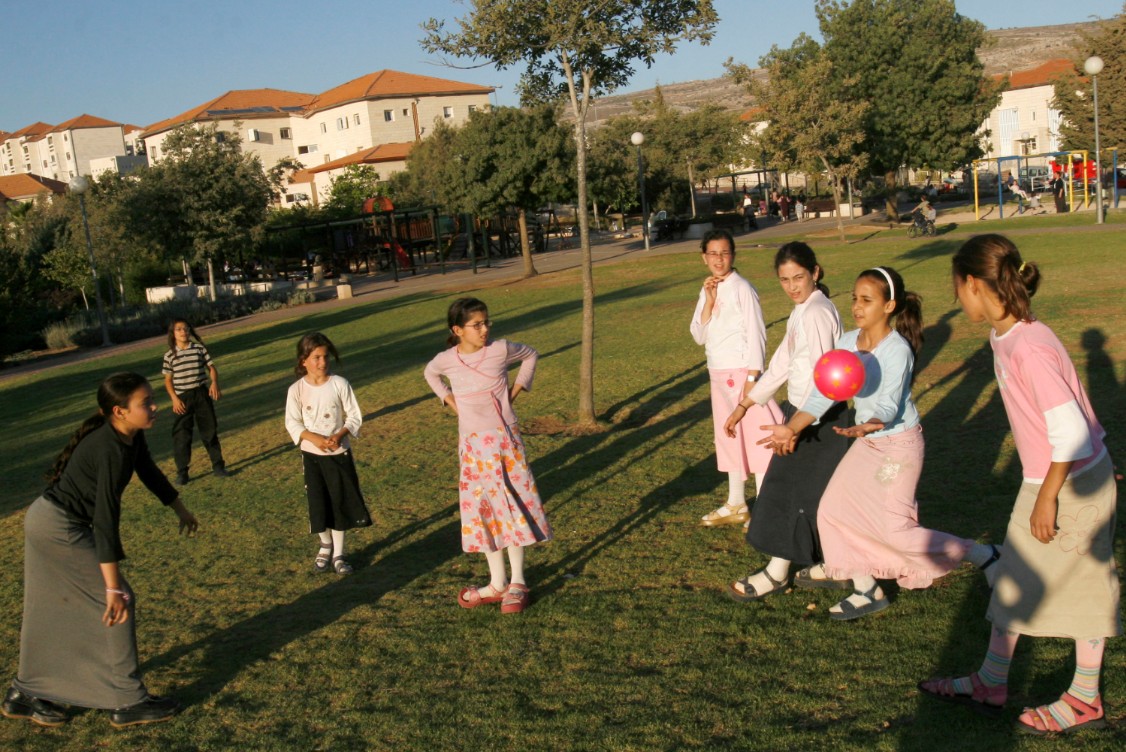Who Loves Shabbat? How Girls from Non-Religious Homes Learn to Love and Celebrate It
It all started with an initiative by a woman from Bnei Brak who moved to Jerusalem and discovered that the girls playing in the yard knew little about Judaism—or Shabbat. She began inviting them to her home each Friday night, and from there, the initiative grew into a nationwide phenomenon. Yes, you can join this revolution too.
 (Illustrative photo: Flash 90)
(Illustrative photo: Flash 90)What would you think if you heard about a group of young girls gathering in a home on Friday night to sit by the Shabbat candles, say the Kabbalat Shabbat prayer, sing Shabbat songs, and learn Shabbat laws together?
You might assume it was a wonderful Friday night activity that keeps the girls occupied and gives their mothers a little rest. What's surprising is that these girls attend public schools and come from non-religious families. Believe it or not, girls like this from all over the country participate in Shabbat activities at an ultra-Orthodox family's home every Shabbat evening.
It all started 29 years ago, when the family of Tova Henig moved from Bnei Brak to Jerusalem. "My father-in-law opened a kollel in Jerusalem and wanted my husband, his eldest son, as his chavruta," Henig recounts, who is a marriage counselor by profession. "We looked for an apartment in Jerusalem that we could buy with the proceeds from selling our Bnei Brak home and found one in the Ma'alot Dafna neighborhood."
Back then, Ma'alot Dafna was completely secular, mainly housing career military families, and very few ultra-Orthodox lived there. For Henig, who had lived her entire life in Bnei Brak, moving to Ma'alot Dafna was a real culture shock.
"A week before Rosh Hashanah, we moved into the new apartment. I, a naive Bnei Brak girl, had never seen Shabbat desecration or immodest clothing before, suddenly heard teenagers screaming and acting wild outside on Rosh Hashanah night. These sounds tore at my heart. Is this how the holy day is celebrated?"
Many others might have felt the sorrow Tova Henig experienced, but not considered how they could change the situation. Yet, Henig was not content just to feel sad—she decided to take action.
"I went downstairs to the building courtyard. I saw girls playing and running around as if it wasn't a holiday. I approached a group of girls and asked if they wanted to hear a story. They curiously looked at the dosit who appeared before them and agreed. I sat them in a circle and told them the well-known story of a father who took his son to the king's city. All the way he carried him on his shoulders, and when they reached the city, the gates were locked. The father said to his son: 'I carried you all this way, now I need you. As a small and nimble child, you can climb over the wall, go inside, and open the gates for me.'"
 (Illustrative photo: Flash 90)
(Illustrative photo: Flash 90)"I explained to the girls that this was a parable. All year, their parents take care of all their needs, and now, on the Day of Judgment, they can help their parents have a good year with the prayer of young children—a concept I explained to them. I asked them to say a short prayer for their parents, and they agreed!"
Henig was surprised by their cooperation and decided to try to engage them in regular activities. She invited the girls to come to her home on Friday nights. "They came, we sang together, I told them a story, and gave out treats. By the next Shabbat, I prepared a notebook for each girl and each week, they pasted in an additional page about Shabbat: a short law, an idea, and the importance of Shabbat. The girls were enthusiastic about the new program. I remember one girl getting a stain on her clothes and running to the faucet to clean it, and the other girls yelled: 'You're not allowed!'"
Didn't the parents object to this kind of 'religious brainwashing'?
"Not only did they not object, at some point the mothers requested a class for themselves. I was very young and didn't feel capable of teaching adults, so I invited a different speaker to my home each week. Some of those women had husbands who, heaven forbid, were drug addicts or entangled in various other issues. But they came to the classes, listened, and began to draw closer. Meanwhile, the girls began to visit me every Shabbat for the third meal and truly became part of the household."
Henig dreamed of turning her Shabbat activities into a nationwide organization. "Throughout that period, I dreamed of opening more branches of Kabbalat Shabbat for girls, creating a revolution particularly among young girls, and specifically through connecting them to the holiness of Shabbat."
In my vision, I saw organizing joint Chanukah parties for them, Chol HaMoed events, and a large, holy movement spreading across the country."
But then her family's path changed again. "We moved abroad for the same reason we moved to Jerusalem. My father-in-law was appointed head of a kollel in Los Angeles and wanted his eldest son by his side. So we went, and the dream went with me. Later, we moved to Europe, following my husband's mission, and again the dream traveled with me..."
When they finally returned to Israel, Tova Henig's old dream began to take shape. "Of course, it took time, but I was determined to make it happen. I prepared new and updated materials for Shabbat activities: designed, colorful, suitable for both girls and mothers. I prepared memorabilia for the girls. Then I simply sent out an email to everyone I knew, calling for women interested in starting such activities—I named it 'Source of Blessing Project'—to get in touch with me."
And the inquiries began to pour in. "Each woman manages her branch in her own style," Henig emphasizes. "There's one branch where the organizer sits with the girls until her husband arrives, then they have the opportunity to hear Kiddush and be impressed. Another woman contacted me, requesting to host girls for the entire Shabbat so they can experience a real Jewish Shabbat at a young age.
In Holon, a woman named Ilana Dayan opened a branch and told me that on the first Shabbat, there were 10 girls, and by the second, 15 had arrived. They pray Kabbalat Shabbat, talk about the virtues of Shabbat, she tells them a story, and distributes folders, magnets, and treats. In the Ramat Eshkol branch, they told me that when a girl got dirty during Kabbalat Shabbat and ran to clean the stain with water, her friends yelled: 'Limmor, what do we have washing machines for? To save us from Shabbat desecration!'"
At the Rehovot branch, a mother asked the organizer if she could join, wondering why it was only for the girls...
Henig welcomes each new branch that opens but aims to see such branches thriving across the entire country.
"Shabbat has a special blessing; if Israel observes two Shabbats, they are redeemed. Why wait for adult teshuva seekers to see a Shabbat table for the first time?
"If someone is looking to add blessing to their life—Shabbat is the source of blessing, as is known from the Chafetz Chaim, that it can bless those who need salvation. I have no doubt that anyone who takes on this activity for the sake of Shabbat will be blessed. Anyone interested in joining will receive all the necessary support from me. I will even send volunteers to the neighborhood on a weekday to register girls for this activity. I am ready to do whatever it takes, as long as more branches are established!"
Interested in joining the initiative? Contact Tova Henig at: henigto@gmail.com

